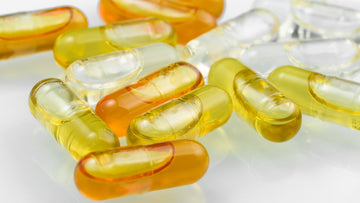1. What is Coenzyme Q10 — Ubiquinol / Ubiquinone?
Coenzyme Q10 (CoQ10) is a naturally occurring, fat-soluble coenzyme found in virtually every cell of the human body, primarily located in the mitochondria — the powerhouse of the cell. It plays a critical role in the synthesis of ATP, the “energy currency” that fuels nearly all cellular processes.
CoQ10 exists in two forms:
-
Ubiquinone (oxidized form)
-
Ubiquinol (reduced form)
These forms can be converted back and forth in the body. When ubiquinone is taken orally, it is converted into ubiquinol during absorption, and in the bloodstream, CoQ10 mainly circulates as ubiquinol.
✅ As we age — especially beyond 40 — the body’s ability to convert ubiquinone to ubiquinol decreases significantly.
Therefore, supplementing directly with ubiquinol becomes a more effective option as it is more readily absorbed and utilized by the body. Since CoQ10 is fat-soluble, taking it with dietary fats enhances absorption.
👉 [Shop: KANEKA Ubiquinol Q10]

2. Benefits of Coenzyme Q10
-
Essential for energy production in all cells, particularly in high-energy organs: heart, brain, kidneys, and liver
-
Supports stamina, reduces fatigue, and enhances overall energy metabolism
-
Crucial for heart health — helps improve pumping efficiency and cardiovascular function
-
Acts as a powerful antioxidant — fat-soluble and produced by the body itself
-
Neutralizes free radicals, protects DNA/proteins, and prevents lipid peroxidation
-
Supports immune health and helps slow down aging
❗ CoQ10 levels peak in our 20s and naturally decline with age — especially in the heart.
Supplementation is especially beneficial for:
-
Adults under high stress
-
People over 40
-
Individuals taking statins, which reduce natural CoQ10 levels
👉 [Shop: KANEKA Ubiquinol Q10]
3. Dosage and Safety of Coenzyme Q10
CoQ10 is generally well-tolerated, with rare mild side effects like:
-
Stomach discomfort
-
Nausea
-
Vomiting
-
Diarrhea
According to the U.S. National Institutes of Health (NIH):
-
CoQ10 is safe as a dietary supplement
-
No liver toxicity reported, even in higher doses (up to 1200 mg/day)
-
Typical dosages range from 100–300 mg/day
-
Long-term supplementation with ubiquinol is considered safe
References:
-
PDQ Cancer Information Summaries. National Cancer Institute (US); Jun 7, 2022. Coenzyme Q10 (PDQ®): Health Professional Version
-
Hidaka T, et al. Biofactors. 2008;32(1-4):199-208
-
Deshmukh G, et al. J Toxicol. 2019;2019:3680757







